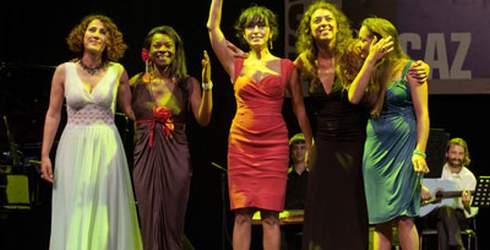
"We are from Cuba. We are musicians", said Javier Limón who is actually from Spain. Limón was seemingly irritated after a part of the audience protested loudly against Kurdish singer Aynur during the Turkey premiere on 15 July of Limon's newest project called "Mujeres de Agua". Agua, water, here stands for the Mediterranean and brings together singers from Portugal, Spain, Greece, Turkey and Israel.
The concert was part of the Istanbul Jazz festival in the Harbiye Open Air Theatre, which is located in one of Istanbul's most elegant quarters, Nisantasi. Boutiques, fancy shopping malls, cool bars and expensive restaurants coin the quarter and the audience seems largely to actually either live or go out in that quarter.
Nisantasi is synonymous for the most Westernized, "cultivated" part of Turkish society, classical music, Western clothing, alcohol, foreign languages traveling abroad etc.. And ticket prices starting with 40TL ($25) and ranging up to 120TL ($75) assure that this layer largely stays among themselves.
The concert started as planned. Javier Limón and Sandra Carrasco opened with classical Flamenco, a guitar and a voice. Later, percussion and piano (from Cuba) was added becoming modern fusioned Flamenco. The concert also ended as planned, Greek singer Glykeria sang four songs in Greek.
However, around in the middle of the concert it is was everything but planned. Turkey was represented by one of its most impressive younger voices, Aynur (Dogan) who released her latest album last year, Rewend. As the other singers too, Carrasco in Spanish, Glykeria in Greek, Buika in Spanish, Rita in Hebrew, also Aynur sang in her native language being Kurdish.
Her first song was still "tolerated" by the whole audience. During the second song protests started by shouting "the martyrs' blood is not yet dried" (referring to the recent death of 13 Turkish soldiers) and "sing Turkish" and started whistling.
When Aynur then even "dared" to sing a third song in Kurdish, the protest volume increased and forced her to leave the stage.
For the cultivated, surely English-speaking and well traveled protesters Kurdish is equal to terrorism, separatism and can not be accepted as representing Turkey.
Therefore the Kurdish singer needed to be silenced. These protesters would define themselves as modern, pro-European, open-minded and tolerant.
However, besides the whistling and booing there was also cheering and "Aynur, Aynur" chanting, the audience was divided, and only few left their seats and moved towards the exits where they started singing the national anthem while next singer Buika was already on stage.
It took some minutes to cool down the atmosphere, then Buika, Guinean living in Spain, Rita from Israel and finally Glykeria from Greece could continue the concert. Being black, Jewish (and this in a country where concerts by Israeli artists nowadays get regularly cancelled because of threats) or Greek then was not a problem.
Aynur's performance was not a surprise, she was part of the program, on posters, in articles concerning the concert and in her repertoire are almost exclusively Kurdish songs.
Did the protesters who were largely sitting in the more expensive seats, expect her to sing Turkish, why?
However, years ago it would not have been possible to have such a performance at all and usually the Kurdish-language singers do not get invited to mainstream festivals in Western Turkey.
So, these two and a half songs might be seen as a step forward, but also show that the bigger problem in solving the Kurdish issue lies in the West, not in the East, is with the Turks not with the Kurds.
Limón's next project will be Hombres de Fuego, Men of Fire. He should come back with that project to Istanbul too, and try to have more than two and a half songs in Kurdish then. (EEG/NV)




